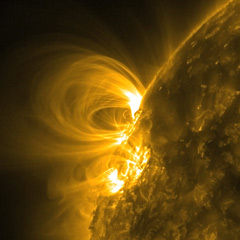UMBC Receives Grant to Operate NASA Center Focused on Space Weather
The University of Maryland, Baltimore County (UMBC) will administer a new NASA research center focused on studying space weather and the impact it can have on human activities.
The Goddard Planetary Heliophysics Institute (GPHI), operating under a 5-year, $10 million cooperative agreement, will provide support and resources for university researchers to collaborate with scientists at NASA’s Goddard Space Flight Center as they refine efforts to predict the solar activity that ejects charged particles into space. The “weather” created by these events interferes with power grids, telecommunication systems and other activities on Earth, while also threatening spacecraft and creating risks for space travel.
“This agreement offers a great opportunity to continue research that is deepening our understanding of solar and magnetospheric physics,” said Jan Merka, director of the new center. “The main goal is to more reliably predict space weather so we can avoid the impacts on space and Earth activities caused by extreme solar and magnetospheric events.”
The GPHI research portfolio was formerly part of the UMBC-administered Goddard Earth Sciences and Technology Center (GEST). The cooperative agreement that established GEST in 2000 expired in May, and research now encompassed by GPHI was re-competed separately from the rest of the GEST portfolio. The remainder of GEST is now administered under a new cooperative agreement between NASA and the University Space Research Association.
The research group at GEST that focused on heliophysics has expanded to 16 researchers at GPHI.
UMBC has a long history of working closely with scientists at NASA and the Goddard Space Flight Center. In addition to GPHI, UMBC administers the Joint Center for Earth Systems Technology (JCET), which focuses on geosciences and is now in its sixteenth year. The university is also a partner in the Center for Research and Exploration in Space Science and Technology (CRESST), which focuses on astrophysics.
“We are delighted to continue collaborating with NASA in the area of planetary and heliophsyics research as GPHI scientists work to expand our understanding of space weather,” said Geoff Summers, UMBC’s vice president for research. “This ongoing area of research is particularly exciting as it both increases our understanding of the solar system and helps explain the effect of space weather on Earth.”
(6/21/11)

